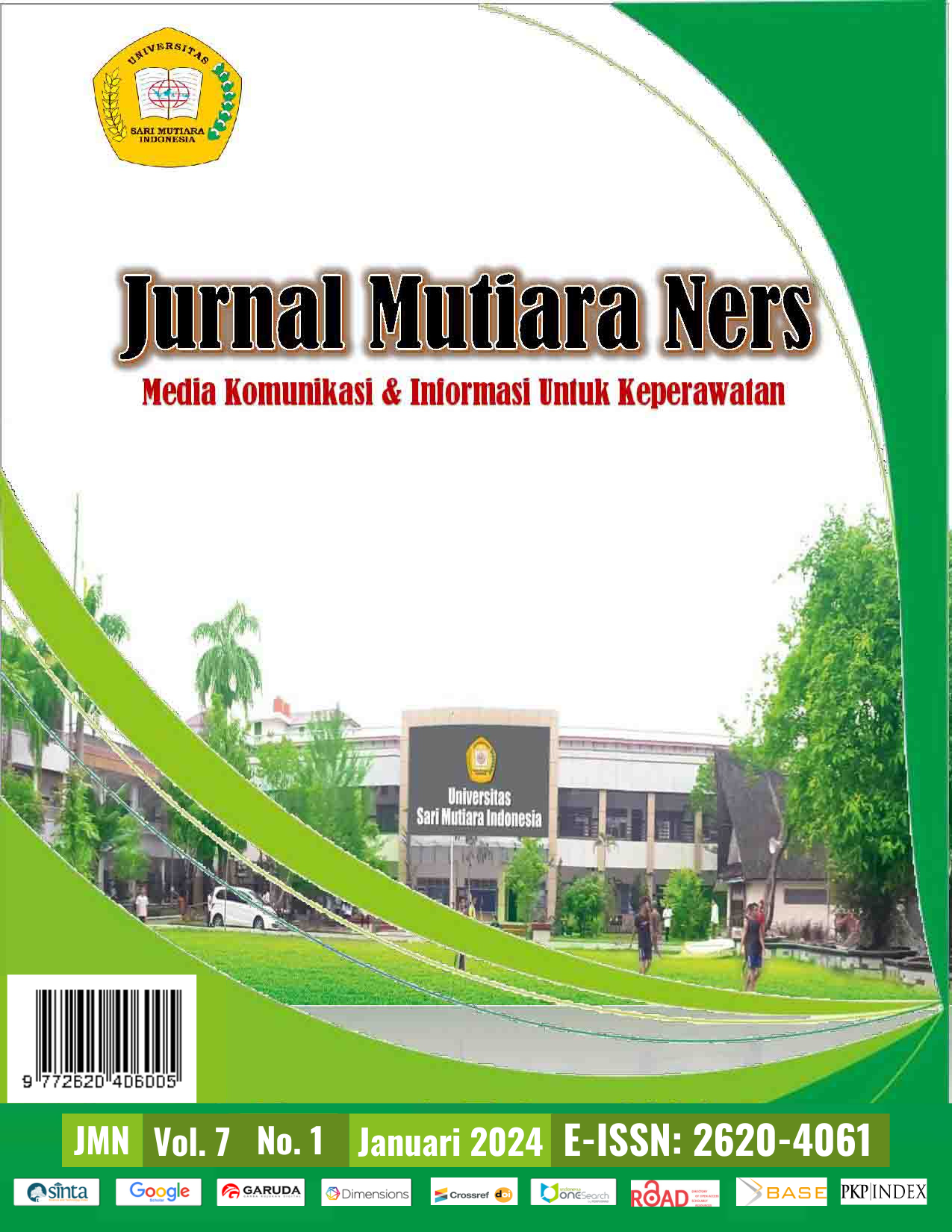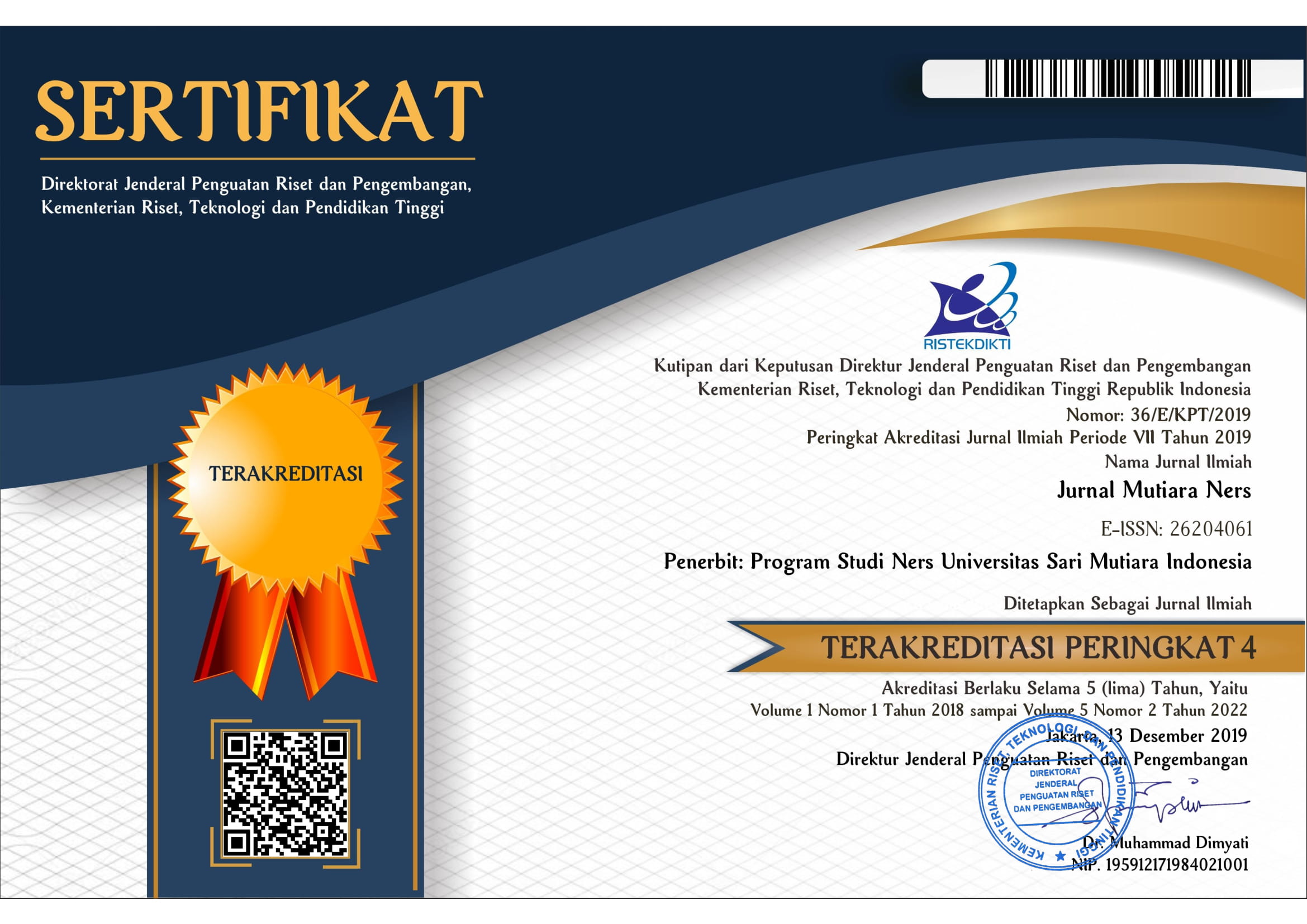EFFECTIVENESS OF PEER COUNSELING EDUCATION USING THE HEALTH BELIEF MODEL APPROACH TO THE SUCCESS OF EXCLUSIVE BREASTFEEDING
Keywords:
Peer counseling, health belief model, exclusive breastfeedingAbstract
Exclusive breastfeeding for babies aged 0-6 months is very beneficial both for the baby as immunity and for the mother to prevent breast cancer and other diseases. Existing data shows that there is still a low number of mothers who provide exclusive breastfeeding, around 48% of babies aged < 6 months do not receive exclusive breastfeeding. Urgency of Research, low coverage of the success of exclusive breastfeeding both at the national level, 65%, provincial and at the research location; the majority of mothers lack knowledge in efforts to successfully provide exclusive breastfeeding; It is still felt that the methods and media used in exclusive breastfeeding education are very monotonous and require holistic and continuous education. Peer education takes the form of in-depth sharing with peers as informants so that mothers absorb information well. Peer education can increase BSE and mother's motivation in breastfeeding. This type of research is quasi-experimental with a pre-post non-control group approach. The aim of this research is to analyze the effectiveness of peer education using the health belief model approach on the success of exclusive breastfeeding. The location of this research is Cinta Damai Village, Percut Sei Tuan District, Deli Serdang Regency. The population of this study were all mothers who breastfed babies aged <6 months, using a total sampling technique. Hypothesis testing in this research uses a different test (Independent Sample T-Test). The research results found that peer counseling using the health belief model approach was effective in increasing maternal knowledge, attitudes about the success of exclusive breastfeeding (p-value 0.00) and the achievement of exclusive breastfeeding.
Downloads
References
Ifni W, Nelfi S. Efektivitas Pepaya (Carica Papaya L) terhadap Kelancaran Produksi ASI Pada Ibu Menyusui. J Midwifery Science. 2021;5(2):158-6. https://doi.org/10.36341/jomis.v5i2.1692
Siti S, Heda MNN, Meita D. Perbandingan Teknik Pemerahan ASI Tangan Dengan Manual Breast Pump Terhadap Kenyamanan Ibu dan Kualitas ASI. J Midwifery Science. 2020; 4(2): 86-95. https://doi.org/10.36341/jomis.v4i2.1322
Victora CG, Bahl R, Barros AJ, França GV, Horton S, Krasevec J, et al. Breastfeeding in the 21st century: epidemiology, mechanisms, and lifelong effect. The Lancet. 2016;387(10017):475- 90. 10.1016/S0140-6736(15)01024-7
Kementerian Kesehatan RI. Laporan Kinerja Kementerian Kesehatan. Jakarta; 2021
Kementerian Kesehatan RI. Hasil Utama Riset Kesehatan Dasar. Badan Penelitian dan Pengembangan. Jakarta: 2018
Kasmawati, K, Kadar R, Sony BMS, Lisda WL, Nurfatimah N. Pendidikan Kesehatan untuk Meningkatkan Cakupan Pemberian ASI Eksklusif di Desa Patirobajo Kabupaten Poso. Community Emp. 2021;6(4): 666-9. https://doi.org/10.31603/ce.4493
Ratih KW, Vide BD, Nurin F. Pendidikan Kesehatan Untuk Meningkatkan ASI Eksklusif. J Community Engagement in Health. 2021; 4(1): 149-54. https://doi.org/10.30994/jceh.v4i1.129
Kementerian Kesehatan RI. Data dan Informasi Profil Kesehatan Indonesia 2018. Katalog Dalam Terbitan. Jakarta: 2019
Maya CA, Sukesti S. Pengaruh Peer Education Terhadap Self Efficacy dan Motivasi Pada Ibu Menyusui Dalam Pemberian ASI. J Ilmu Keperawatan Komunitas. 2018; 2(1): 26-32 https://doi.org/10.32584/jikk.v2i1.302
Umi S, Philipa HP. Faktor-Faktor Yang Mempengaruhi Kegagalan Ibu Dalam Pemberian ASI Eksklusif. J Kebidanan Malahayati. 2019;5(3):199–04. http://dx.doi.org/10.33024/jkm.v5i3.1418
Nurul H, Dian NAS. Hubungan breastfeeding self-efficacy dengan motivasi dalam pemberian ASI eksklusif ibu hamil trimester 3 di Puskesmas Umbulharjo Yogyakarta. J Riset informasi Kesehatan. 2018; 7(2):134-9. http://jurnal.stikes- hi.ac.id/index.php/rik/article/view/144
Juneris A, Ni Nyoman SAD, Netti EB. Peningkatan Pengetahuan Cara Peningkatan Produksi ASI Melalui Edukasi Konseling Teman Sebaya (Peer Counseling). J Midwifery Science. 2023; 7(1):79-85. https://doi.org/10.36341/jomis.v7i1.2937
Bekti Y. Efektivitas Kelompok Pendukung Asi (Kp-Asi) Eksklusif Terhadap Perilaku Pemberian ASI Eksklusif. J Ilmiah Bidan. 2017; 2(1): 48-54. https://e- journal.ibi.or.id/index.php/jib/article/view/24
Mestika L, Asima S, Idaria S. Peningkatan Breasfeeding Self Efficacy Melalui Edukasi Teman Sebaya (Peer Education). J Midwifery Science. 2023; 7(1): 79-85. https://doi.org/10.36341/jomis.v7i1.3124
Published
How to Cite
Issue
Section
Copyright (c) 2024 Ronni Naudur Siregar, Nettietalia Br. Brahmana, Juneris Aritonang

This work is licensed under a Creative Commons Attribution-ShareAlike 4.0 International License.







.png)
